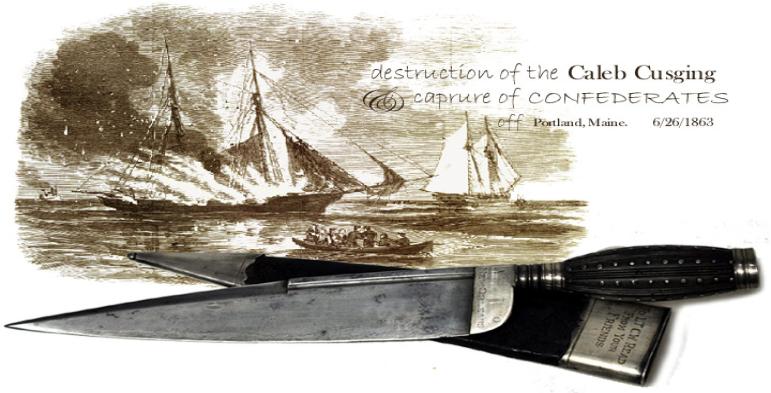


Presented to Confederate States Navy Lt. Charles W. Read by his friends aboard the Confederate Ship McRae, this silver mounted naval dirk would have come to Lt. Read earlier in the war when the slightly built 1860 Annapolis grad was serving aboard that ship. With a courageous history far too extensive to recount here, suffice it to say that as of the early morning of June 26,1863 when the C. S. N. officer and his crew boldly maneuvered there captured Southport, Maine fishing schooner Archer into Casco Bay, Read and his band had become the focus of search by a Union Navy flotilla of no less than thirty heavily armed war vessels. At one point the daring Read and his crew had racked up a record of 22 captured prizes in 21 days. Referred to as illegals and pirates in the North, Read had caused unparalleled damage to Federal commerce and spread terror among Yankee citizenry all along the East Coast. C. S, Navy Lt. Charles W. Read would be awarded the Confederate Medal of Honor for his daring leadership on this day. The citation would read in part: Learning that the revenue cutter Caleb Cushing was anchored at Portland, Maine, Lt. Read entered the harbor and under cover of night, quietly seized the cutter and cleared the harbor before dawn despite the disadvantage of tide and a light wind. Pursued by an overwhelming enemy force, Lt. Read kept his guns firing until his ammunition was exhausted. Realizing that further resistance was futile Lt. Read ordered his men into lifeboats and then fired the Caleb Cushing before surrendering to the enemy. In actuality it seems the Confederate Officer’s luck had run out when he and his crew raised the ire of Portland’s Yankee citizenry. Upon notice of a lookout in the old city observatory which still stands on Portland’s Munjoy Hill, a chase crew was quickly assembled from among the excited Portlanders augmented by a contingent of U. S. Regulars stationed at Ft. Preble and a small number from the 7th Maine Volunteers home on recruiting duty. The hard fought Lt. Read must have peered through his glass in wonderment as the boilers of the side wheeler Forest City and the screw driven passenger steamer Chesapeake bellowed black smoke closing the distance to the escaping Caleb Cushing and it’s crew of Confederate sailors. When the Forest City pulled away in response to cannon fire from the captured Revenue Cutter, the smaller Chesapeake, her decks awash with angry citizenry, continued the pursuit despite the passage of at least one solid shot through her rigging. Out of ammunition and options Read and his crew were forced to abandon their prize but not before setting fire to her. Fortunately for the Confederates it fell to the lagging Forest City with its contingent of better disciplined 17th U. S. Regulars to pluck them from the sea as the Chesapeake with her cargo of rowdy citizens stood off the stricken Caleb Cushing. As the flames struck her powder magazine the sound of a tremendous explosion rocked the islands of Casco Bay. The little band of angry citizens aboard the Chesapeake cheered and fired their muskets in the air as debris from the Caleb Cushing fell down around them. The Forest City and the Chesapeake returned to the mainland as conquering heroes. With muskets firing into the air, church bells ringing, and the Army band from Fort Preble to welcome the victorious. The frenzied citizenry were bent on immediate hanging of the Rebel Pirates. It was only with the fixed bayonets of the 17th U. S. Regulars that Read and his crew were saved from the rope. It was quickly determined that the Confederates would be imprisoned under Federal oversight at Ft. Preble rather than at the City’s Monroe Street Prison. When word of the threats against Read and his men reached Confederate President, Jefferson Davis, a statement was issued from Richmond that should the Mainers make good their threats of execution, the ten highest ranking from among Union officers imprisoned in the South would be hanged in reprisal. The Confederates were quickly moved to Ft. Warren in Boston harbor. In the aftermath relics taken from the invading sailors were put on display in Portland window fronts.






